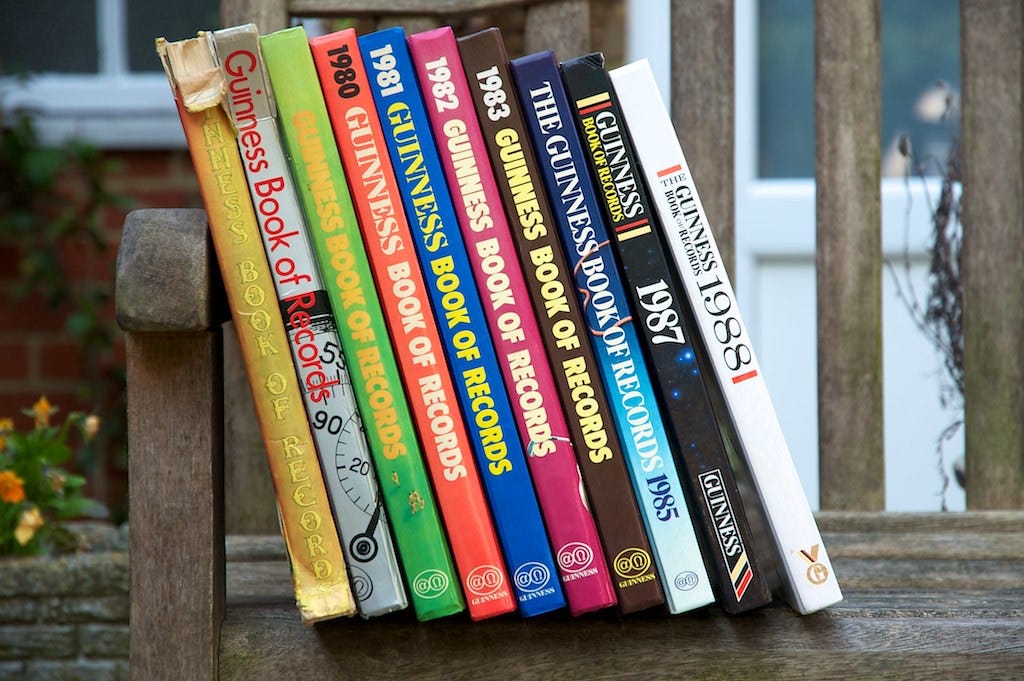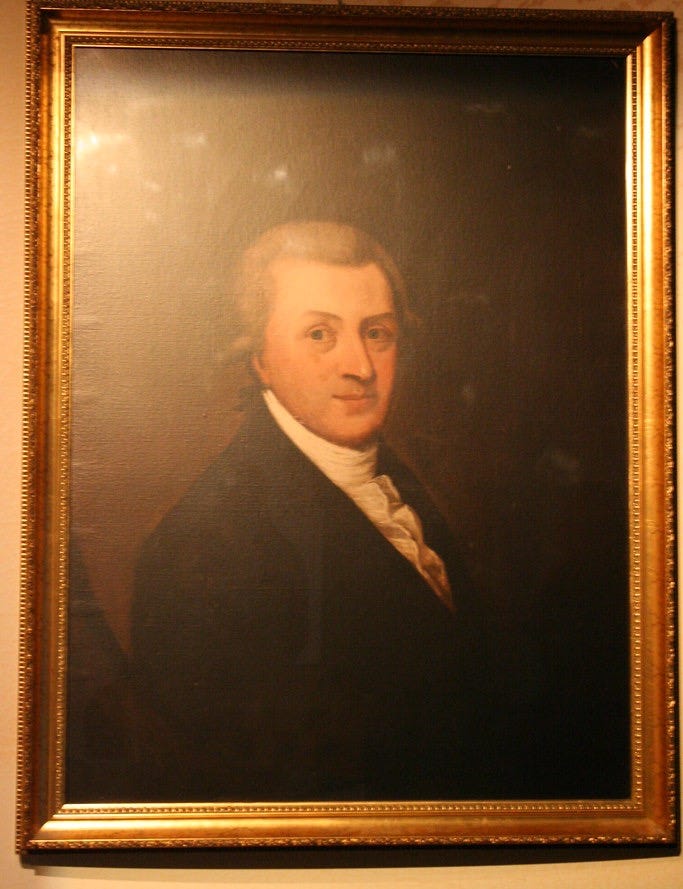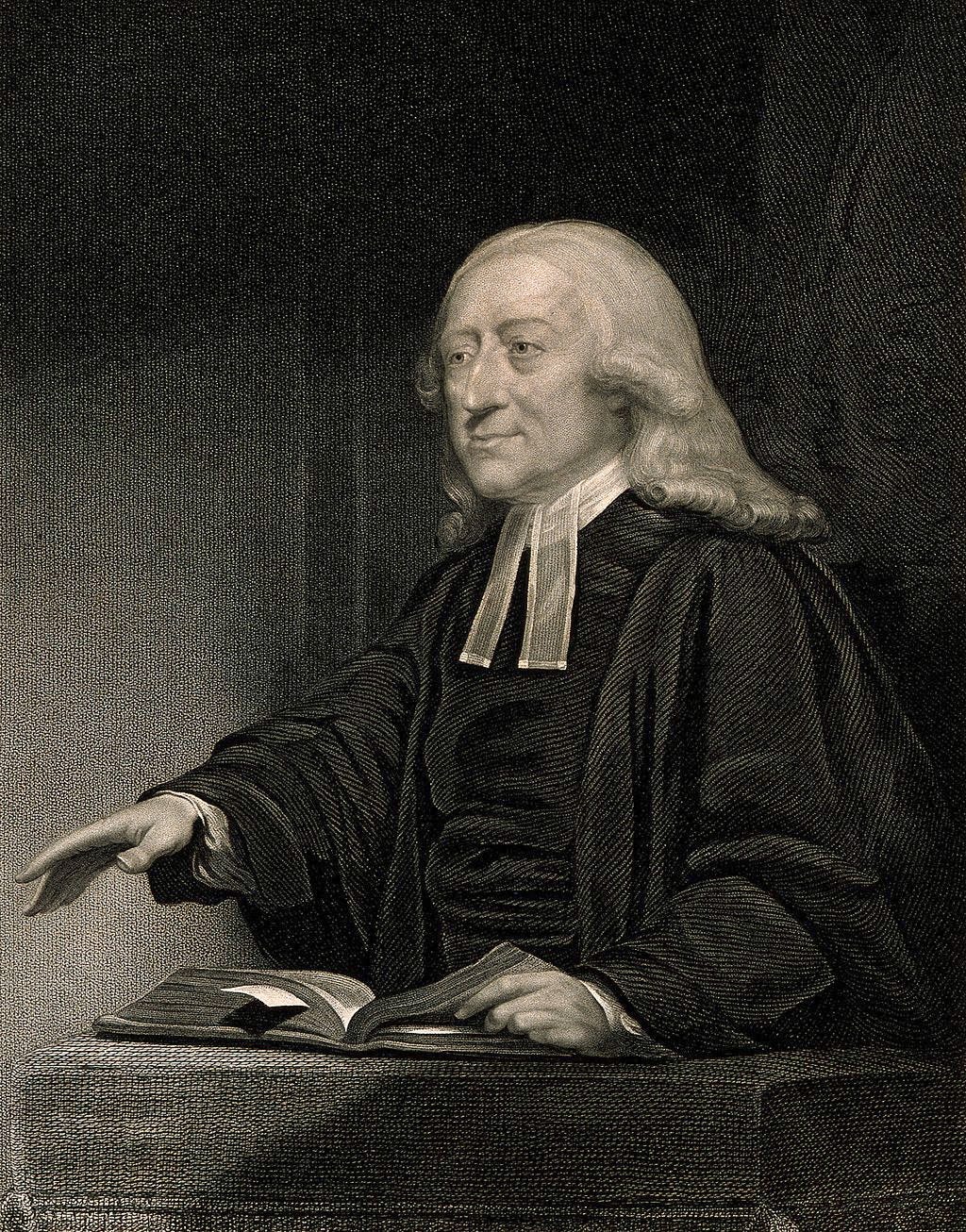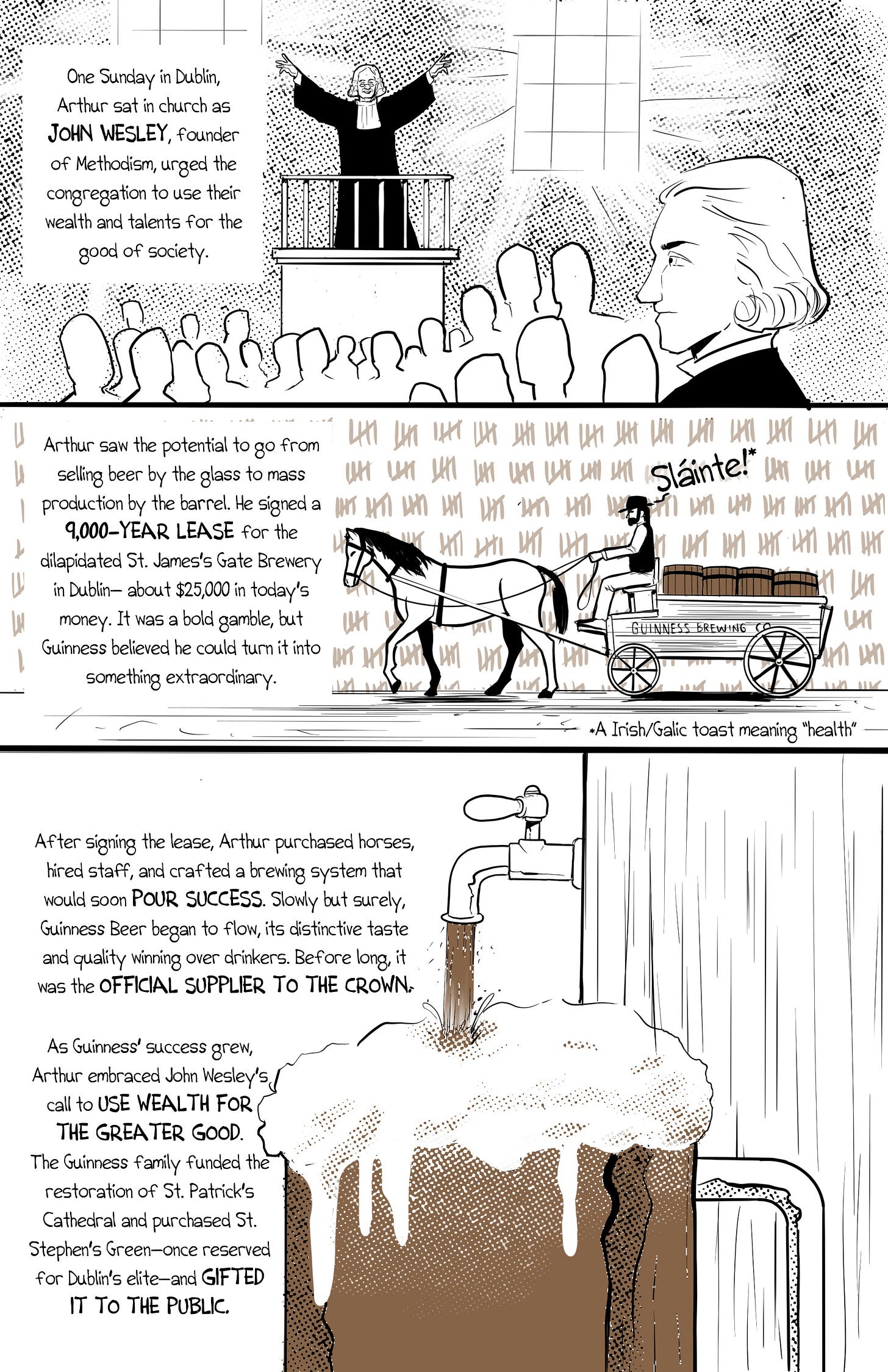Guinness: Brewing Good (full comic)
A mini-comic series telling the story of entrepreneur and philanthropist Arthur Guinness—how he founded Guinness Beer and brewed for good.

I’ve always loved Guinness Extra Stout. Yuengling Black and Tan is a strong second, but Guinness is a strong finish. I’ve even visited their brewery in Dublin.
It’s an interesting twist of fate that my wife, Leanne, and I have become close friends of Os Guinness and his wife, Jenny. I was first introduced to the story of William WIlberforce by my pastor in Pittsburgh in 1984 after Os presented Garth Lean’s biography of Wilberforce, God’s Politician, to a small group that he was part of.
Os Guinness is an author and cultural commentator, as well as grandson to Arthur Guinness, the founder of the Guinness brewing empire. He comes from “the poor Guinesses” side of the family, he is quick to remind. He is also quick to tell you that he is British, but a keen observer and advocate of the American Experiment. He is a modern-day Alexis de Tocqueville.
It is for this reason that when I ran the Senate Republican Conference, I asked Os to give the keynote address to senators in the Governor’s Palace in Williamsburg. It proved to be one of the most memorable moments of my 16 years on the Hill, and became the source material for Os’ book A Free People’s Suicide. He was the architect behind the Williamsburg Charter, which invited diverse stakeholders to affirm their support for the freedom of religion. He is also an advocate of a new Renaissance, and the role of Christians in promoting a flourishing society.
As we explored the idea of a mini-comic on Arthur Guinness, there was only one person who it made sense to talk with. Over the next four weeks, we will share parts of a conversation we had with Os in the office to coincide with a new comic page, and will include QR codes for you to watch or listen to the interview. Today, we begin the interview with Os and the Guinness Storehouse origin story.
Mark Rodgers
Well, fun to see you Os. Thank you for being willing to come to my man cave.
Os Guinness
Well, my pleasure.
Mark Rodgers
Anything strike you as you walked around the office, just out of curiosity?
Os Guinness
Well, I love many of the same people that you would love and admire.
Mark Rodgers
Well, I admire Guinness Stout, too.
So your name Guinness, I’m sure you get asked all the time: “Are you related to the Guinness beer? And the answer is?
Os Guinness
Well it depends on which part of the country. In Baptist circles, are you related to the Book of Records? The answer is both.
Mark Rodgers
Interesting. Explain “both” please, I don't have the Book of Records backstory.
Os Guinness
Well, the Book of Records. I often tease Rick Warren, he mentions his book as one of the greatest non-fiction sellers of all time. And I say to him, “wait a minute, Rick, long out sold by the Guinness Book of Records”
But that came after some members of our family were actually hunting, and at the end of the day, they had an argument about which birds flew the fastest. Out of that came the idea of putting a book of superlatives of all sorts, you know, the strongest, fastest, and so on. But much of the family can be embarrassed by it today because it's become rather gross. How many pies can you eat? And so on.
Mark Rodgers
I didn't realize that was actually part of the Guinness family story. But on to Guinness beer. Arthur Guinness was the founder. Tell us, what is your relationship to Guinness?
Os Guinness
Well, I'm the great, great, great grandson -- three greats. And historians of the family say the best known, of course, are the brewing Guinnesses, and then we have a branch called the banking Guinnesses. But then I'm from the side of the family, because I'm descended from his youngest son, believe it or not, he had 20 children by the same wife, and only 10 survived to adulthood. I'm descended from the youngest but our side of the family is usually known as the gentleman Guinnesses, or the Guinnesses for God or the poor Guinnesses. I’m not from the wealthy side, in other words. But my cousins are.
Mark Rodgers
I assume you've been back more than once to visit the founding families. Is there still a manor home, or a Guinness estate that has been preserved?
Os Guinness
Well, there are all sorts of mansions. The most famous is Ashford Castle, where many films have been, and that was refurbished by the family. But certainly I've got a lot of family in the Dublin area, and always enjoy visiting them.
Mark Rodgers
Tell us about Arthur Guinness, was he also from a wealthy family?
Os Guinness
Not at all. His grandfather was a sheep farmer. I always say to myself, you know, just as Jews say, ‘but Abraham, my father was a wandering Aramean.’ You know that phrase in the Bible. I always say to myself, ‘my father was a barefoot kill their shepherd,’ from a very poor family.
But his godfather was wealthy, and became the vice chancellor of Trinity College Dublin and the Archbishop of Cashel, where they make the wonderful blue Irish cheese. And he left him 100 pounds after he'd worked for him about eight years, which is equivalent to about 30,000 today. But, there are a lot of myths surrounding it. I mean, there's a book on the family that says “The Lord gave him a vision of beer for Christians,” rubbish. He just was taught how to make beer by his maternal grandfather, and he became a very good beer maker. Now he did come to faith. Notice, our family was traditionally Anglican Church of Ireland, which at that stage was about 1/3 of Ireland. It’s much fewer today and much less faithful.
But, in the first Great Awakening under John Wesley, the revival broke out in 1739 and Wesley came for the first time in 1747. Arthur Guinness went to hear him, came to faith, and from then onwards, called himself evangelical and born again. That word is not just a modern word. He founded, for example, Ireland's first Sunday school. Now that wasn't the sort of break between services in a genteel way, like you have it in the US. It was literally a school for, quote, “ragged children who had no other education.” So he followed Wesley's Council, ‘earn all you can save, all you can, give all you can.’ And the family, for three generations, was deeply Christian about their generosity. So they gave anonymously, never putting their name behind, no names on buildings. So he was an ardent Christian.
Mark Rodgers
Interesting. Was his conversion prior to starting a brewery, or after?
Os Guinness
Prior, he founded the brewery the same year Wilberforce was born, 1759. I love that simple fact. But of course, on the one hand, it was the great age of Georgian Ireland. But on the other hand, a revolutionary age. You had the American Revolution, you had the French Revolution, and the French and the Irish Catholics were very close, and you had unrest across Ireland. So, he was a strong Christian and a Whig. In other words, those who are in favor of freedom, he wasn't a reactionary, far from it, but it was an extraordinary revolutionary time.
Mark Rodgers
In the history that I share about Clapham, we talk about the reformation of manners being a broad framework to address a number of social pathologies that were plaguing, in particular, the lower classes at the time. Alcoholism, out of wedlock birth rates, an economic disparity that was fostering populist uprisings in Europe, also in England. Can you talk about the conditions for the lower classes in Ireland at that time?
Os Guinness
Well, not just Ireland, but right across the English speaking world, England, Wales, Scotland and Ireland. In other words, there was decadence, there was violence, there was corruption. It wasn't just the lower classes with poverty, it was the upper classes. So in many ways, England was inches from the condition that led in France, later to the French Revolution. And what made the difference in England? I mean, historians like William Lecky say that the revival, their first awakening, saved Britain from the French Revolution. And, of course, as you know well, the first generation, Wesley, Whitfield and people like Jonathan Edwards here in the US, the whole of the lower classes were touched profoundly. So Whitfield preaching to minors with tears running down their faces, carving white lines in their sooty faces. It didn't touch the upper classes. You had a few like the Countess of Huntingdon, who was Whitfield's patron, but of Wilberforce's significance, he was the next generation. So when he brought the reformation of manners or moral standards into the leadership classes, that truly changed the world.
Mark Rodgers
When we were in London recently, we went over to see the church at Woolnoth, Newton's church in London. Evidently, when Wilberforce went to see him in secret, he traveled around the church two or three times to make sure nobody saw him go in, because Newton would have been viewed in more of a negative way, as evangelicals were by the elites. To make your point, they were not considered socially acceptable then in Ireland as well.
Os Guinness
Well the elites in Ireland were English. It was the time of what they called the ascendancy, and the Catholics were truly oppressed. And oddly, back in the 12th century, it was the Celtic Christianity. It is not Roman Catholic, and it's not Protestant, and it's not orthodox. It was very much itself: the land of saints and scholars and Patrick and so on. It was the English who imposed Catholicism on Ireland. So, when the English went for the Reformation, the Irish dug in their heels all the more to be determinedly Catholic. So you had in the 18th century, the English establishment, the so-called ascendancy, were the oppressors. Now, to Arthur Guinness' credit, he was one of those who fought for the emancipation of Catholics. They couldn't vote, and so on. He fought for them, and many people said cynically, he wanted to sell beer to them. No but I think there's no doubt that his motives were, everyone needed freedom.
Mark Rodgers
So Arthur becomes a believer. You said in the 1740s?
Os Guinness
Probably 1747, the brewery was founded in 1759. From the beginning, there was no Wilberforce reformation then. From the beginning, he along with, but independently, Cadbury’s and Fry’s, the two famous chocolate makers, were Quakers. But all three were great in advancing corporate interests, so that the generosity for healthcare and education and sports clubs and even the salary was always 10% above the Irish average and so on. And then philanthropy- they built housing for the poor in London and in Dublin. One time, I landed at Dublin Airport, was driving in a cab to the city, and I don't know how the name came up, but the cab driver stopped, and with a sort of mock flourish, he came around to the passenger door, and opened it before I knew what was happening. He kissed my hand as if I was a pope, and he said, I'm partly teasing, but your family has done so much for my family in this whole city, I want to thank you. There's no question that our family has been the most generous philanthropists.
















